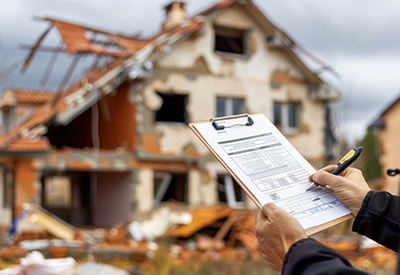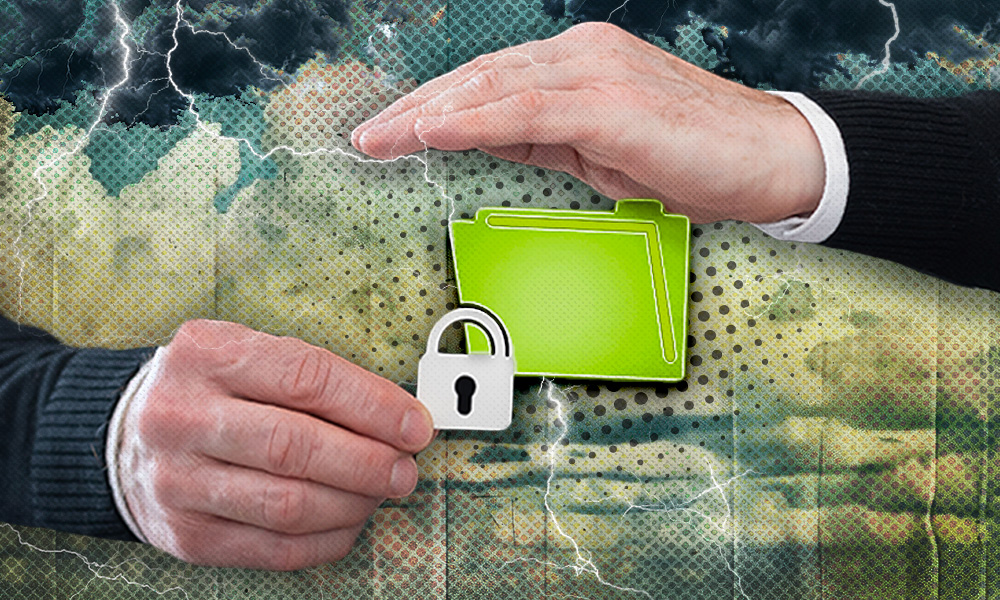Natural disasters pose unique and often overlooked challenges to estate planning that extend far beyond the immediate physical destruction they cause. While the devastating impact of floods, fires, hurricanes, tornadoes and earthquakes on property is evident, these events can also compromise critical estate planning documents, disrupt access to digital assets and create complex insurance and legal challenges for families. Understanding these vulnerabilities and implementing comprehensive protective measures — including proper document storage and digital backups — is essential for creating a disaster-resistant estate plan.
How do natural disasters impact estate planning?
The most direct impact of natural disasters on estate planning involves the physical vulnerability of essential documents. Mother Nature can destroy original wills, trusts, powers of attorney and other crucial estate planning documents. Without proper backup systems and storage protocols, years of careful planning can literally wash away or burn to ash in moments.
Many individuals store their estate planning documents at home in locations that can prove inadequate during severe natural disasters. Even seemingly secure storage solutions like home safes can fail when exposed to extreme conditions. Floodwater can breach so-called waterproof containers, while fires can generate enough heat to damage documents in fire-resistant safes.
As a result, traditional approaches that rely solely on physical document storage no longer may be sufficient. Fortunately, modern estate planning can incorporate multiple layers of protection to ensure that critical documents and information remain accessible when needed most.
How can I protect my estate plan from a disaster?

Modern estate planning employs multiple protective layers to ensure document survival and accessibility in the event of a disaster. Those layers include:
- Physical protection. While no longer sufficient alone, proper physical storage remains important. Climate-controlled environments, water-resistant containers and fire-rated safes do provide the first line of defense. Multiple physical copies stored in different geographic locations help guard against regional disasters.
- Digital backup. Securing electronic copies can provide redundancy and accessibility. Professional-grade scanning creates high-resolution digital versions that preserve all document details. Electronic storage can include multiple formats to help ensure long-term accessibility as technology evolves.
- Cloud storage. Encrypted cloud storage services offer additional protection and accessibility. Professional-grade cloud solutions can provide security while ensuring authorized access from any location.
What happens if my estate planning documents are destroyed?
The destruction of estate planning documents in a natural disaster doesn't automatically invalidate your estate plan, but it can create serious complications for families.
When original documents are destroyed, the legal process can becomes more complex and time-consuming. Courts generally maintain that a lost will doesn't mean a revoked will, but proving the contents of the lost documents requires additional steps and evidence.
Your estate planning services provider or attorney’s law firm may maintain copies of your estate planning documents in their files or digital records. These copies can serve as crucial evidence of your intentions and help expedite the process of reconstructing your estate plan. However, some documents, like wills, typically require the original for optimal legal effectiveness, making document protection and backup especially important.


What should I do if I lose my legal documents?
If your estate planning documents are lost, taking immediate action is essential. First, contact your estate planning services provider to determine if they have copies of your documents in their files. Many firms now maintain secure digital copies of client documents specifically for such emergencies. An attorney can help assess which documents need to be replaced immediately and which can wait.
Next, gather any evidence of your original documents' existence and contents. This might include copies stored digitally or with other family members, correspondence with your attorney about the documents or witnesses who were present at the document signing. Banks, financial institutions and insurance companies may also have copies of certain documents in their records.
Reconstructing your estate plan after a natural disaster requires careful attention to detail and proper legal procedures. An attorney likely will need to help you recreate any lost documents, ensuring they accurately reflect your original intentions while complying with current laws. This process may involve:
- Creating new original documents that match your previous estate plan.
- Obtaining new notarizations and witness signatures.
- Updating any references to changed circumstances.
- Ensuring compliance with current state laws.
- Establishing new safeguards against future loss.
Are copies of my legal documents valid?
While copies of legal documents can be valuable in proving your intentions, they may not always carry the same legal weight as originals. Different states have varying requirements regarding the acceptance of copies of estate planning documents versus original documents. Some jurisdictions may require additional court procedures to validate copy-based probate, while others may be more flexible in accepting alternative evidence of your estate plan.
Power of attorney documents and health care directives often face fewer restrictions regarding copies, as many institutions accept copies of these documents in emergency situations. However, having original documents remains the ideal situation for smooth estate administration.
What are vulnerabilities of digital assets?

As estates increasingly include digital assets, natural disasters pose new challenges for accessing and protecting these resources. Local computer storage devices containing passwords, cryptocurrency keys and important digital documents can be destroyed. Even cloud-based storage solutions may become temporarily inaccessible if disasters damage infrastructure or prevent electronic access.
The loss of digital access credentials can lock estate administrators out of important online accounts and resources. Without proper digital estate planning that includes secure off-site storage of access information, valuable digital assets may become permanently inaccessible.
How should I protect and manage digital assets?
A comprehensive digital asset protection strategy requires multiple layers of security and accessibility. Create and maintain a secure digital asset inventory including:
- Cryptocurrency wallet addresses and recovery phrases.
- Online banking and investment account credentials.
- Email and social media account information.
- Cloud storage access details.
- Digital business assets and intellectual property records.
Implementing robust backup protocols forms a critical foundation of digital asset protection. At the heart of this strategy is the "3-2-1" backup rule: Maintain three separate copies of all important data; store them on at least two different types of media; and keep one copy in an off-site location. This systematic approach should include encrypted external hard drives stored across different geographic locations to guard against regional disasters.
What documents should be included in your disaster-proof estate plan?
A robust, disaster-resistant estate plan should include copies of all essential documents. Your last will and testament, living trust documents and advance health care directives form the foundation of this collection. These should be accompanied by durable powers of attorney, insurance policies, property deeds and financial account information. Personal identification documents and digital asset access instructions round out the essential document package.
Creating a comprehensive inventory of these documents, including their storage locations and access procedures, has become increasingly important. This inventory should be regularly updated and shared with trusted advisors and family members who may need to access these documents during an emergency.
How does insurance work with my estate plan in a disaster?

Insurance planning and estate planning share a common goal: protecting assets and providing for beneficiaries. However, many people treat these as separate activities, leading to dangerous gaps in coverage and protection. Effective estate planning requires careful consideration of insurance coverage across multiple dimensions, from property protection to liability coverage and beyond.
When natural disasters occur, insurance often represents the first line of defense for preserving estate assets. Without proper integration of insurance and estate planning, even the most carefully crafted estate plan can fail to achieve its objectives. The key lies in understanding how different types of insurance coverage interact with estate planning tools and strategies.
A thorough insurance coverage assessment forms the foundation of integrated planning. This assessment must go beyond basic policy reviews to examine how coverage aligns with estate planning goals. Key considerations include:
- Property insurance coverage. Standard homeowner's policies often exclude or limit coverage for certain natural disasters. Flood insurance requires separate policies through the National Flood Insurance Program or private insurers. Earthquake coverage typically demands additional riders or standalone policies. Estate planners must consider coverage levels match the full replacement value of assets intended for distribution to beneficiaries.
- Personal property documentation. Detailed inventories of personal property, including photographs and appraisals, become crucial for both insurance claims and estate administration. Regular updates help ensure coverage levels remain adequate as collections grow or asset values change.
- Business continuation coverage. Family businesses require specialized insurance planning to protect their value as estate assets. Business interruption insurance, key person coverage and proper liability protection can help preserve business value for future generations.
Conclusion
Natural disasters represent a significant but manageable risk to estate plans when proper precautions are taken. The key to creating a disaster-resistant estate plan lies in implementing multiple layers of protection across all aspects of your estate. Regular review and updating of these protective measures can help ensure your estate plan remains robust and accessible when needed most. While we cannot prevent natural disasters from occurring, thoughtful preparation can help safeguard your legacy and provide peace of mind for both you and your beneficiaries. Work with qualified estate planning professionals to assess your plan's vulnerability to natural disasters and implement appropriate protective measures before they're needed. Remember, the time to prepare for a natural disaster is well before it strikes.



